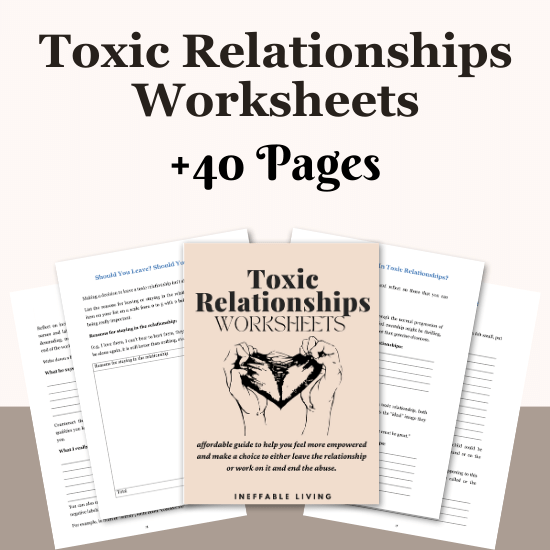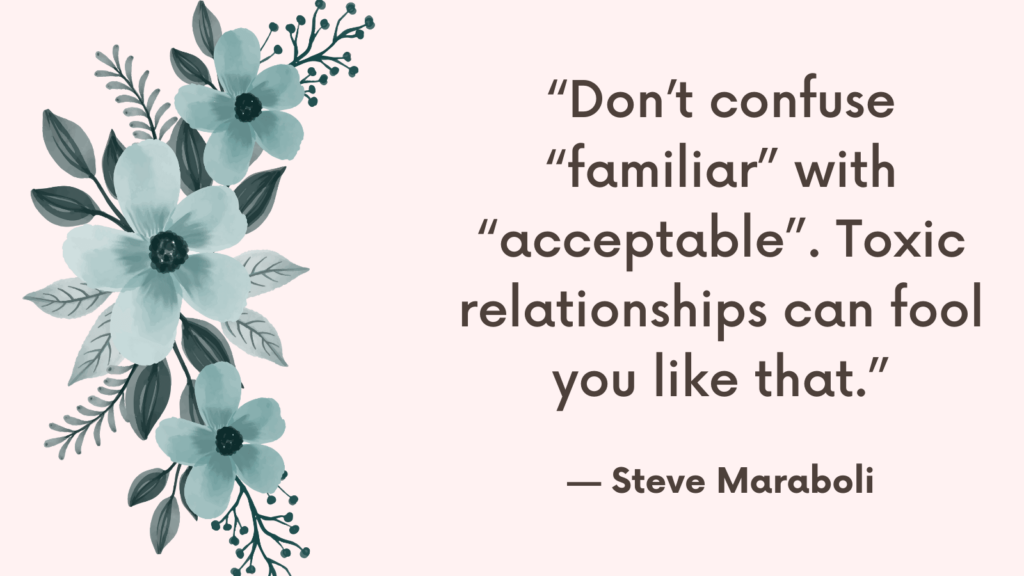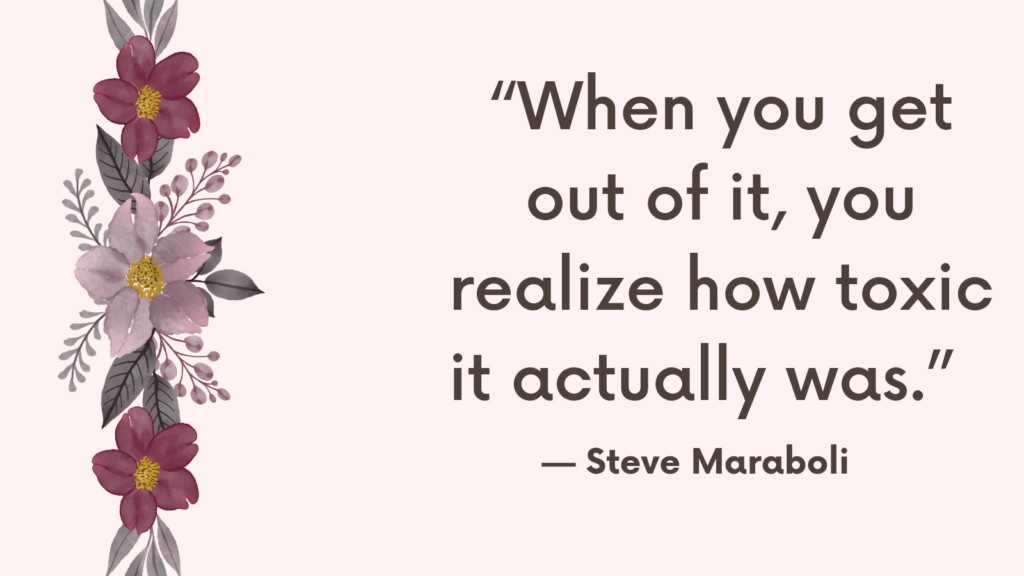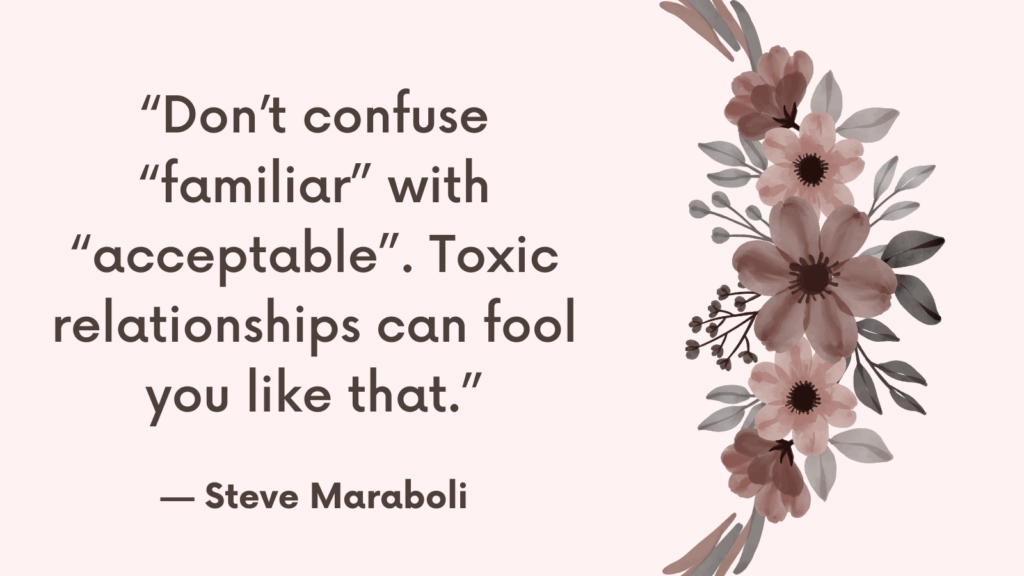In this post, you’re going to find out reasons why people stay in toxic relationships.
What Constitutes A Toxic Relationship?
A toxic relationship is characterized by behaviors, actions, and patterns that are detrimental to the well-being of one or both partners.
It can exist in any type of relationship, including romantic, familial, friendships, and professional connections.
Here are key characteristics that define toxic relationships:
1. Lack of Support
Relationships should be supportive, but in a toxic relationship, one or both parties often undermine or belittle the other’s achievements and dreams.
2. Constant Criticism
Constructive criticism can be healthy, but constant, unwarranted criticism that makes you feel inadequate or unworthy is a sign of toxicity.
3. Control and Manipulation
Attempts to control or manipulate the other person’s actions, decisions, or emotions, often through guilt, threats, or subtle manipulation tactics.
4. Disrespect
A lack of mutual respect is evident through actions, communications, and violations of boundaries, showing little regard for the other person’s autonomy and feelings.
Related: Best 40 Journal Prompts For Toxic Relationships
5. Hostility
Frequent anger, hostility, or aggression, whether through words or actions, can create a pervasive sense of walking on eggshells to avoid conflict.
6. Neglect and Ignorance
Emotional neglect and ignoring the needs or concerns of the other person, leading to feelings of loneliness and abandonment even when in the relationship.
7. Lack of Trust
Trust is the foundation of any healthy relationship. Toxic relationships often feature jealousy, suspicion, or paranoia, lacking a secure base of trust.
8. Poor Communication
Communication is either hostile, absent, or ineffective, with discussions frequently escalating into arguments without resolution or understanding.
9. Codependency
An unhealthy codependency can develop, where one or both partners rely excessively on the other for emotional support, validation, and identity.
Related: Finding Peace After A Toxic Relationship In 5 Steps
10. Isolation
Efforts to isolate one partner from their friends, family, or support network, either through manipulation or control, reducing the person’s sense of independence.
11. Gaslighting
A form of manipulation where one person causes the other to doubt their perceptions, memories, or sanity, often denying wrongdoing or shifting blame.
12. Impact on Self-Esteem
Constant exposure to negativity, criticism, and disrespect can erode self-esteem, leading to self-doubt and a reduced sense of self-worth.
13. Physical or Emotional Abuse
Any form of physical harm, threats, or emotional abuse designed to control, intimidate, or hurt the other person is a clear sign of a toxic relationship.
Recognizing these signs is the first step toward addressing the toxicity and seeking help.
It’s important to remember that being in a toxic relationship is not a reflection of your worth or desirability as a person.
Related: Top 10 Books About Toxic Relationships
Why Do People Stay In Toxic Relationships?
People stay in toxic relationships for a variety of complex and deeply personal reasons. These factors can make it challenging for individuals to leave, even when they recognize the harm the relationship is causing to their well-being.
Here are some common reasons why people might stay in toxic relationships:
1. Fear of Being Alone
Some individuals fear the loneliness that might come with leaving a relationship more than the toxicity within it.
2. Fear of Retaliation
There may be fear of what the partner might do if they attempt to leave, especially in cases of physical or emotional abuse.
3. Low Self-Esteem
Constant criticism and belittlement can erode an individual’s self-esteem, leading them to believe they don’t deserve better treatment or that no one else would want them.
Related: Top 8 Tips on Letting Go of Toxic People
4. Financial Dependence
In many cases, one partner may be financially dependent on the other, making it difficult to envision a way to leave without facing significant financial hardship.
5. Children and Family Pressure
The desire to maintain a family unit for the sake of children can be a strong motivator to stay, as can pressure from extended family to keep the relationship intact.
6. Love and Emotional Attachment
Love and emotional attachment, especially during the “good times,” can make it hard to leave. Individuals often hope for a return to better days or believe their love can change their partner.
7. Hope for Change
Many stay because they hold onto hope that their partner will change, often based on promises made during periods of remorse or good behavior.
Related: 7 Signs of a Toxic Person & How to Deal with Them
8. Normalization of Toxicity
For those who grew up in environments where toxic relationships were the norm, there may be a lack of awareness that what they’re experiencing isn’t healthy.
9. Isolation
Toxic partners often isolate their victims from friends and family, eroding their support network and making it harder to seek help or leave.
10. Investment
The time, effort, and resources invested in the relationship can make it hard to let go. This is known as the “sunk cost fallacy,” where individuals continue a behavior or endeavor as a result of previously invested resources.
11. Cultural or Religious Beliefs
Cultural or religious beliefs about marriage and divorce can strongly influence an individual’s decision to stay in a toxic relationship.
12. Lack of Support
Without a supportive network of friends and family, leaving can seem insurmountable, especially if the individual feels they have nowhere to turn.
Related: How To Not Let People Get To You? Top 7 Strategies
Should you leave? Should you stay?
Deciding whether to leave or stay in a toxic relationship is a deeply personal and often complex decision.
It involves weighing various factors, including your own well-being, the presence of children, financial considerations, and the potential for change.
Considerations for Leaving
1. Your Safety and Well-being
If the relationship is physically, emotionally, or psychologically abusive, leaving is often the best option to protect your safety and health.
2. Impact on Mental Health
Consider the impact the relationship has on your mental health. If it leads to anxiety, depression, or a loss of self-esteem, leaving might be necessary for your well-being.
3. Children’s Welfare
Consider the effects of the toxic environment on any children involved. Children can be deeply affected by witnessing toxic dynamics.
4. Possibility of Change
Assess whether your partner has shown a genuine commitment to change. This includes seeking professional help, making consistent efforts to improve, and acknowledging their toxic behaviors.
5. Support System
Evaluate whether you have a support system in place, such as family, friends, or community resources, to help you through the transition.
Related: How To Forgive A Narcissist? Top 9 Tips
Considerations for Staying
1. Commitment to Change
If both partners are committed to making substantial changes, including seeking therapy individually and together, there may be a path forward.
2. Financial or Practical Reasons
Sometimes, immediate leaving isn’t feasible due to financial constraints or other practical reasons. In these cases, planning and preparation are key.
3. Cultural or Religious Beliefs
Personal beliefs and values can play a significant role in the decision to stay and work on a relationship.
4. Positive Changes and Efforts
If you’ve seen consistent, positive changes over time, it might be worth considering whether further improvement is possible.
Related: How Does A Narcissist React When You Stop Chasing Them?
Steps to Take Regardless of Decision
1. Seek Professional Help
Consulting with a therapist can provide clarity, support, and guidance, whether you decide to stay and work on the relationship or leave.
2. Build a Support Network
Strengthen your support network by reaching out to friends, family, or support groups who can provide emotional support and practical assistance.
3. Plan for Safety
If there’s any risk of harm, develop a safety plan that includes ways to leave quickly if necessary, and know the contact details for local domestic violence shelters and hotlines.
4. Educate Yourself
Learn about the dynamics of toxic relationships and recovery processes. This knowledge can empower you to make informed decisions.

Conclusion
Recognizing these reasons can be the first step in seeking help or supporting someone else.
Ultimately, the decision to leave or stay is yours to make, and it’s important to prioritize your safety and emotional health.



